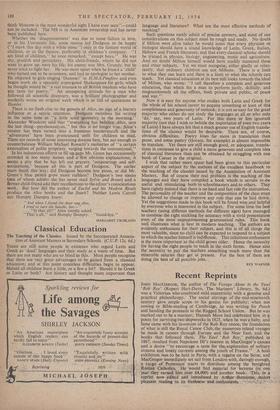THERE are still some people in existence who regard Latin
and Greek as 'dead' languages and their study as a waste of time. But there are not many who are so blind as this. Most people recognise that there are very great advantages to be gained from a classical education; and at this point countless difficulties begin to appear. Should all children learn a little, or a few a lot? Should it be Greek or Latin or both? Are history and thought more important than language and literature? What are the most effective methods of teaching?
Such questions rarely admit of precise answers, and most of our considerations on this subject must be rough and ready. No doubt if Milton were alive today he would insist that every physicist or biologist should have a sound knowledge of Latin, Greek, Italian, Hebrew and French literature, and that every classical scholar should be trained in physics, biology, engineering, music and agriculture. And no doubt Milton himself would have readily mastered these and other subjects. Yet we must recognise, either gladly or reluc- tantly, that ordinary children are not Miltons. There is a limit to what they can learn and there is a limit to what the schools can teach. Yet classical education at its best still looks towards the ideal of Milton, who wrote: "I call therefore a complete and generous education, that which fits a man to perform justly, skilfully, and magnanimously all the offices, both private and public, of peace and war."
Now it is easy for anyone who studies both Latin and Greek for the whole of his school career to acquire something at least of this completeness and generosity of outlook; it is not so easy for the great majority who either do not study the languages at all or who only 'do,' say, two years of Latin. For this more or less ignorant majority (not that I wish to belittle the importance of even two years of Latin) I have always felt that a much greater use of English transla- tions of the classics would be desirable. There are, of course, obvious difficulties. Poetry loses far more in translation than prose, and some poetry (Horace, for example) is almost impossible to translate. Yet there are still enough good, or adequate, transla- tions in existence to give a child a more generous and complete idea of classical literature than can be obtained by struggling with one book of Caesar in the original.
I wish that rather more space had been given to this particular aspect of the subject by the authors of the excellent handbook to the teaching of the classics issued by the Association of Assistant Masters. But of course their real problem is the teaching of the languages and they have compiled a book which is certain to .be useful and stimulating both to schoolmasters and to others. They have rightly insisted that there is no hard and fast rule for instruction. The personality of the teacher and the composition of the class must be allowed to change or improve any rule that can be laid down. Yet the suggestions made in this book will be found wise and helpful by everyone who is interested in the subject. For some time the best teachers (using different methods for different ages) have managed to combine the right stickling for accuracy with a vivid presentation even of the most unprepossessing grammatical rules. This book well illustrates what is best in modern teaching. The authors are evidently enthusiasts for their subject, and this is of all things the most valuable, since no child can be expected to respond to a subject to which the teacher himself is indifferent. This infectious enthusiasm is the more important as the child grows older. Hence the necessity for having the right people to teach in the sixth forms. Hence also the necessity to pay the teachers something much more than the miserable salaries they get at present. For the best of them are doing the best of all possible jobs.
REX WARNER


































 Previous page
Previous page